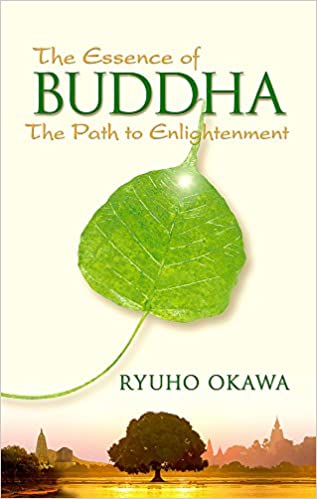The Essence of Buddha: The Path to Enlightenment by Ryuho Okawa
The concept of enlightenment
Ryuho Okawa is a Japanese spiritual leader and the founder of Happy Science, a religious organization that combines Buddhist and other Eastern teachings with Western philosophy.

The Essence of Buddha: The Path to Enlightenment is a book written by Ryuho Okawa that provides an overview of Buddhist teachings and practices. The book explores the concept of enlightenment and its relation to the Buddha’s teachings, including the Four Noble Truths, the Eightfold Path, and the Five Precepts.
The Four Noble Truths are the foundation of Buddhist teachings and consist of the following: (1) suffering exists, (2) suffering arises from craving and attachment, (3) it is possible to end suffering, and (4) the path to the end of suffering is the Eightfold Path. The Four Noble Truths provide a basic understanding of the nature of existence and offer a roadmap for reducing suffering.
- The Truth of Suffering (Dukkha)
Okawa teaches that suffering is an inherent part of the human experience. He explains that all beings are subject to the law of cause and effect, and that negative actions and thoughts create negative consequences. This leads to various forms of suffering, including physical pain, emotional distress, and spiritual malaise.
- The Truth of the Cause of Suffering (Samudaya)
Okawa identifies the cause of suffering as attachment and desire. He explains that our attachment to things like wealth, status, and material possessions leads to suffering because these things are impermanent and can never fully satisfy us. In addition, our desires can lead us to harm others in order to fulfill them, creating further negative karma.
- The Truth of the Cessation of Suffering (Nirodha)
According to Okawa, the cessation of suffering is possible through spiritual practice and enlightenment. By understanding the nature of reality and the impermanence of all things, we can overcome our attachment and desire and achieve inner peace. This requires developing a strong spiritual foundation through practices such as meditation, self-reflection, and compassionate action.
- The Truth of the Path to the Cessation of Suffering (Magga)
Okawa identifies the path to the cessation of suffering as the Eightfold Path, which is a set of guidelines for ethical and spiritual behavior. The Eightfold Path consists of right understanding, right intention, right speech, right action, right livelihood, right effort, right mindfulness, and right concentration. By following these guidelines, we can cultivate wisdom, compassion, and inner peace, and ultimately achieve enlightenment.
Overall, Okawa’s interpretation of the Four Noble Truths emphasizes the importance of spiritual practice and self-reflection in overcoming suffering and achieving inner peace. He encourages his followers to cultivate compassion, wisdom, and mindfulness in all aspects of their lives in order to achieve spiritual growth and enlightenment.
The Eightfold Path is a set of eight practices that lead to the end of suffering and the attainment of enlightenment. These practices are: (1) right understanding, (2) right intention, (3) right speech, (4) right action, (5) right livelihood, (6) right effort, (7) right mindfulness, and (8) right concentration. The Eightfold Path provides a systematic approach to transforming one’s thoughts, words, and actions, and to cultivating wisdom, compassion, and inner peace.
- Right Understanding: This refers to developing a correct understanding of the nature of reality. It involves recognizing the impermanence and interconnectedness of all things and cultivating an awareness of the causes and effects of our thoughts and actions.
- Right Intention: This involves cultivating a sincere and positive attitude towards oneself and others. It requires us to let go of negative intentions such as greed, anger, and ignorance, and instead cultivate positive intentions such as kindness, compassion, and wisdom.
- Right Speech: This refers to using speech that is truthful, kind, and helpful. It involves avoiding harmful speech such as lying, gossiping, and slander, and instead using speech to benefit others and create positive relationships.
- Right Action: This involves behaving in ways that are ethical and compassionate. It involves avoiding actions that harm others or oneself, and instead cultivating actions that benefit others and promote harmony.
- Right Livelihood: This refers to choosing a profession or occupation that is ethical and contributes to the well-being of society. It involves avoiding work that harms others or promotes selfishness, and instead choosing work that serves the greater good.
- Right Effort: This involves making a sustained effort to cultivate positive qualities such as mindfulness, kindness, and wisdom, and to let go of negative qualities such as attachment, anger, and ignorance.
- Right Mindfulness: This refers to developing an awareness of the present moment, and cultivating a clear and focused mind. It involves being mindful of our thoughts, emotions, and actions, and developing a non-judgmental and compassionate attitude towards ourselves and others.
- Right Concentration: This involves developing the ability to concentrate and focus the mind. It involves practicing meditation and other forms of mental training to cultivate a calm and clear mind, and to deepen our understanding of the nature of reality.
Overall, Okawa’s interpretation of the Eightfold Path emphasizes the importance of ethical behavior, mindfulness, and spiritual practice in achieving enlightenment and living a meaningful life. He teaches that by following these guidelines, we can transform ourselves and our world, and contribute to the greater good.
The Five Precepts are ethical guidelines that serve as the foundation of Buddhist morality. They are: (1) to refrain from taking life, (2) to refrain from taking what is not given, (3) to refrain from sexual misconduct, (4) to refrain from false speech, and (5) to refrain from intoxicants that lead to heedlessness. The Five Precepts are intended to promote harmony and avoid harmful actions, and are seen as essential for spiritual progress and the cultivation of virtue.
- Refrain from taking life: This precept involves avoiding harming or killing any living beings. This includes humans, animals, and other living creatures. Okawa teaches that all life is interconnected, and that harming others creates negative karma that can lead to suffering in future lives.
- Refrain from taking what is not given: This precept involves avoiding stealing or taking things that do not belong to us. It includes respecting the property and possessions of others, and cultivating an attitude of generosity and gratitude.
- Refrain from sexual misconduct: This precept involves avoiding harmful or exploitative sexual behavior. It includes avoiding adultery, rape, and sexual relationships that harm oneself or others. Okawa teaches that sexual misconduct creates negative karma and can lead to suffering in future lives.
- Refrain from false speech: This precept involves avoiding lying or speaking in ways that are harmful or deceitful. It includes avoiding gossip, slander, and other forms of harmful speech, and instead cultivating an attitude of honesty and integrity.
- Refrain from intoxicants: This precept involves avoiding the use of drugs or alcohol that cloud the mind and impair judgment. It includes avoiding substances that lead to addiction or harmful behavior, and instead cultivating a clear and focused mind.
Overall, Okawa teaches that following the Five Precepts can help individuals live a virtuous and meaningful life, and avoid negative karma. He emphasizes that these precepts are not strict rules, but rather guidelines that can be adapted to different circumstances and situations. By following these precepts, individuals can cultivate compassion, wisdom, and inner peace, and contribute to the greater good.
The author delves into the essence of Buddhism and offers insights on how to cultivate compassion and wisdom, leading to a state of spiritual liberation and inner peace. The book serves as a guide for readers seeking to deepen their understanding of Buddhism and pursue the path towards enlightenment.
